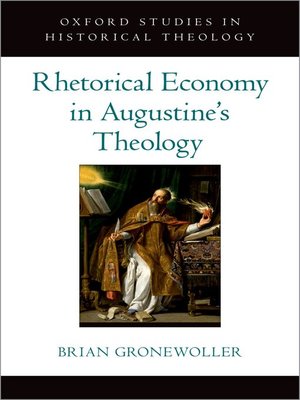Rhetorical Economy in Augustine's Theology
ebook ∣ Oxford Studies in Historical Theology
By Brian Gronewoller

Sign up to save your library
With an OverDrive account, you can save your favorite libraries for at-a-glance information about availability. Find out more about OverDrive accounts.
Find this title in Libby, the library reading app by OverDrive.



Search for a digital library with this title
Title found at these libraries:
| Loading... |
Augustine of Hippo (AD 354-430) studied and taught rhetoric for nearly two decades until, at the age of thirty-one, he left his position as professor of rhetoric in Milan to embark upon his new life as a Christian. This was not a clean break in Augustine's thought. Previous scholarship has done much to show us that Augustine integrated rhetorical ideas about texts and speeches into his thought on homiletics, the formation of arguments, and scriptural interpretation. Over the past few decades a new movement among scholars has begun to show that Augustine also carried rhetorical concepts into areas of his thought that were beyond the typical purview of the rhetorical handbooks. In Rhetorical Economy in Augustine's Theology, Brian Gronewoller contributes to this new wave of scholarship by providing a detailed examination of Augustine's use of the rhetorical concept of economy in his theologies of creation, history, and evil, in order to gain insights into these fundamental aspects of his thought. This study finds that Augustine used rhetorical economy as the logic by which he explained a multitude of tensions within, and answered various challenges to, these three areas of his thought as well as others with which they intersect-including his understandings of providence, divine activity, and divine order.






